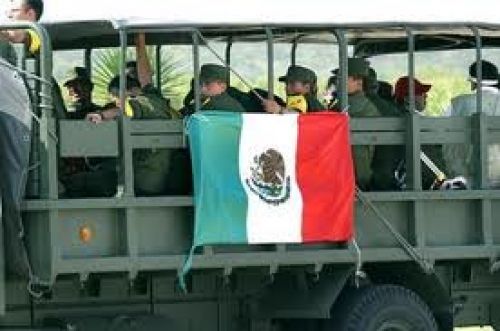By Fred Rosen*
 There are now over 40,000 soldiers patrolling the streets and piloting low-flying helicopters in rural areasOne step forward: Mexico’s Supreme Court ruled on July 12 that members of the military could not be covered by military immunity (fuero) in cases involving the violation of civilian rights. The court ruled unanimously that military personnel accused of crimes against civilians must be tried by civilians, not by their fellow soldiers. The military, ruled the Court, must be held accountable to civilian authority.
There are now over 40,000 soldiers patrolling the streets and piloting low-flying helicopters in rural areasOne step forward: Mexico’s Supreme Court ruled on July 12 that members of the military could not be covered by military immunity (fuero) in cases involving the violation of civilian rights. The court ruled unanimously that military personnel accused of crimes against civilians must be tried by civilians, not by their fellow soldiers. The military, ruled the Court, must be held accountable to civilian authority.
Historian Lorenzo Meyer has commented (on the talk show Primer Plano [1]) that no president since the aftermath of the Mexican Revolution, has used the military to maintain domestic order as systematically and as intensely as Felipe Calderón. Calderón’s war on organized crime (and organized dissidence—see his unilateral dissolution of the militant Mexican Electrical Workers Union) basically relies on a strong military presence on the streets and rural areas of Mexico.
One of the most noticeable changes in daily life since Calderón took office is the routine, nearly ubiquitous presence of soldiers patrolling city streets in jeeps and small armored vehicles. There are now over 40,000 soldiers patrolling the streets and piloting low-flying helicopters in rural areas. They are meant to support law and order, but given the military’s widespread infiltration by members of criminal cartels, the troops have been ineffective—and threatening in their own right.
The fear of violence and criminality is real and widespread in Mexico. And so is the fear of military impunity. People say they feel insecure going about their normal day-to-day business, and would gladly support serious, effective measures against organized crime and violence. But many blame the actions of those in power for at least a portion of that insecurity. There is an expressed feeling that those who are supposed to protect the citizenry from criminal violence are powerless or unwilling to do so, or worse, are directly responsible for the violence itself.
One step forward: Mexico’s Supreme Court ruled on July 12 that members of the military could not be covered by military immunity (fuero) in cases involving the violation of civilian rights. The court ruled unanimously that military personnel accused of crimes against civilians must be tried by civilians, not by their fellow soldiers. The military, ruled the Court, must be held accountable to civilian authority.
The ruling was some 37 years in the making, stemming from the forced disappearance of an activist—and guerrilla sympathizer—named Rosendo Radilla during the “dirty war” in the state of Guerrero in 1974. Just two years ago the Inter-American Court of Human Rights (CIDH) ruled that the federal troops suspected of abducting and assassinating Radilla should have been tried under civilian, not military jurisdiction. The ruling has far-reaching implications. It strikes against the concept and practice of the “just-following-orders” defense linked to military impunity. “Under no circumstances,” ruled the CIDH, should situations that threaten the human rights of civilians be tried under military jurisdiction.
Two steps back: On the other hand, many fear that the military presence will be deepened, strengthened and legitimated should Mexico’s Chamber of deputies pass a number of proposed reforms to the National Security Law [2]—reforms that have been proposed by President Calderón and already passed by a PRI-PAN coalition in the Senate.
The proposed reforms would allow the president to authorize the intervention of federal troops against “movements or conflicts of a political, electoral, social or work-related character” when he considered that they “constitute a challenge or threat” to domestic security.
The proposed reforms would allow members of the armed forces and intelligence agencies to tap phones with a judicial order, to compile files and spy on members of criminal and dissident political groups. The reforms, in short, are aimed at curtailing not only criminal activity but at dissidence in general.
Javier Sicilia, the poet who has become a leader of a burgeoning movement against violence and dedicated to strengthening the bonds among citizens within civil society, has called the National Security Law “absurd,” and “a law that legitimates violence.” He has said that the goal of his citizens’ movement was to persuade the people’s representatives to achieve peace with justice and liberty, for which the National Security Law was useless—”a criminal law.” If the institutions of state are rotten with avarice and corruption, repeat Sicilia and his followers, our only hope is in the construction of a powerful civil society.
[1] http://oncetv-ipn.net/index.php
* This article was taken from Nacla.

